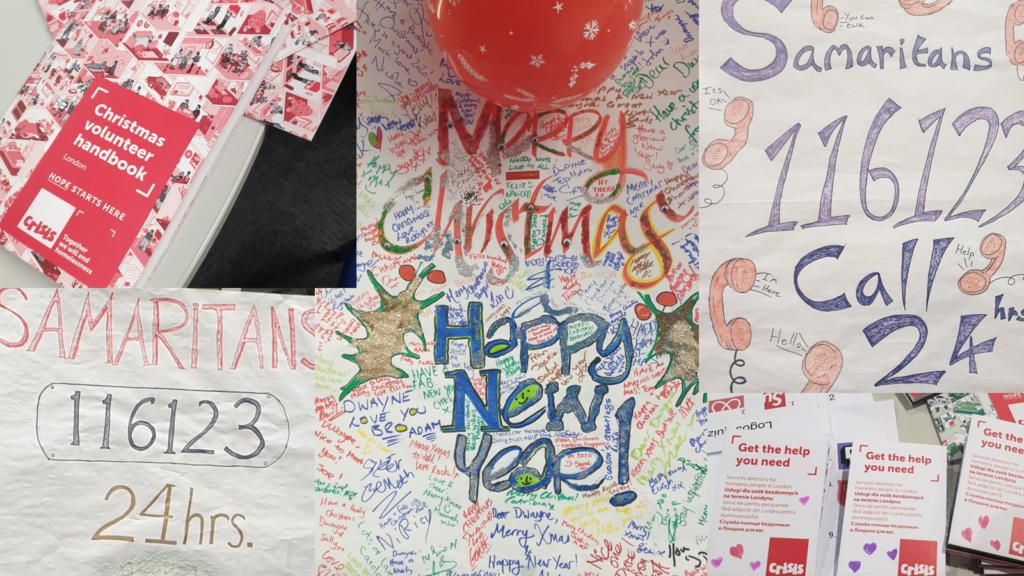
Actually, I think that project management for operations trying to manage deployment of resources and aid during war or national emergencies is probably a more ‘steroid-ey’ operation, with high risk of danger, instability, and uncertainty.
However, I think that the process of providing shelter, relief and services for the homeless over the 8 days between Christmas and New Year, coordinating volunteers, activities, deliveries of food, clothing and services for the guests is “Mythic” in terms of Difficulty level*.
There are quite a few centres that are set up in and around London, utilising Harris Academies and educational centres that have been re-purposed for the festive period. There are day and night shelters, a ‘wet’ shelter – catering to those who had dependency issues, a women’s only shelter, and quiet shelter for those just looking for a place to sleep and rest.
I started volunteering for Crisis in 2001, when they used warehouses and old office buildings that had been vacated. I was part of the ‘grunt’ – or general volunteers who were told where to go, and what to do. Activities ranged from serving teas and coffees** and talking to guests (those who were staying at the shelters during this period), doing art activities, cleaning the toilets, as well as guard or gap duties – i.e. guarding restricted areas such as volunteer’s area, or areas that weren’t safe.
Those trained in cooking and food safety worked in the kitchen to cook and serve delicious food for the guests. I was also amazed and deeply humbled by professionals who give up their Christmas to provide special services to our guests. They include dentists, doctors, paramedics, podiatrists, veterinarians, hair dressers, seamstresses and tailors, masseuse, physiotherapists, chiropractors, lawyers, immigration specialists, housing and benefit advice specialists to name a few.
It is quite obvious that the main team running the operation have epic project management skills in order to coordinate the teams, and the goings on at the various centres to ensure that everything runs as smoothly as possible.
Samaritans working with Crisis
Samaritans have been offering their services to the Crisis volunteers and guests for several years now, and this year, we organised over 100 branch volunteers from all over the country to provide this support.
For the last two years, I’ve volunteered as a Samaritan, so my observation in this article is from the point of the view of someone on the ground.
There are over 200 Samaritan branches located around the country, except for Festival branch – made up of a team of individuals who pitch up at various festivals such as the Reading Festival, Glastonbury, and biker events as well as Crisis over Christmas, and provide emotional support.
The Festival branch coordinates the operation, organises the rota, the timing and destination for the for the shift teams. The branch volunteers who have signed up for our preferred shift timings – we are told what to bring for our stay for those staying overnight – such as sleeping bags, ear plugs, etc, and the rota while we are there.
Teams with a driver and a shift leader were deployed to various centres over 8 hour period, to provide assistance and support to the guests and general Crisis volunteers, and we did not know where we were going, and how the shift would be until we got there.
What was interesting to me was how things came together, despite the fact that sometimes there were things that did not go according to plan.
Emergencies and incidents cropped up, which necessitated Crisis Green badges (Shift leaders) and Samaritan Shift Leaders to adapt to make sure that they were dealt with appropriately and sensitively.
Three Key lessons on Project Management and Teamwork
One: Grassroots enthusiasm from the people in the front line is key
The general volunteers from both organisations, deeply believed in being there for the guests and so, that meant that a lot of them ‘just got on with it’.
I did detect some very minor grumbling about some of the shift patterns, but in general, most were in good spirits and had an amazingly can-do attitude. Be it washing the showers or cleaning the lavatories when there was an ‘accident’, to putting on the high-viz jackets to man the gates, and rolling their sleeves up to cart delivery supplies from trucks to the kitchen and various locations.
The Samaritan shift teams responded whenever the Crisis Green badges or shift leaders made requests, which sometimes meant we had to return to the centre even after our shift was over.
We were all in service of our guests, those who needed a respite from the tough reality that was their day-to-day life during the rest of the year.
We remember that we are the fortunate ones, because a lot of us get to go home at the end of our shifts, and when the holiday is over, we get to go back to work which provides us the means to buy the things we want.
And if we are really lucky, we have family and friends we can spend time with. There are many who do not have what we have.
Two: Recruit Team Leaders who understand the mission but have authority and mandate to get things done.
The main services were available at all the various centres, but were operated slightly differently. In fact, there were things that differed from shift to shift – although not in any significant way. Due to the uncertain nature of what could happy during the course of the day, the key shift leadership team had to be adaptable and go with the flow.
I was very impressed with how these individuals quietly kept in the background of things, making sure that they were available to respond to emergencies, but staying out of the way of everyone getting on with things.
Three: Strong leadership at the top with a clear mission that is communicated to everyone.
I am only speculating, but based on my observations from the ground – I believe that the team structures within the centres operated in a way that would be consistent with the above statement.
If it was not true, Crisis would not be expanding the way it has, year on year, opening more centres, offering more services, recruiting more volunteers, and servicing more guests during Christmas.
They also do amazing work during the year, but the Christmas operation highlights the acute pain of those who are not fortunate enough to be around family, home and hearth during the festive season, and thus
Transferring the lessons to the Corporate sector
There is something about doing meaningful work, creating deep connections with those who work with us, as well as those we work for, that keeps us coming back again and again. Sometimes it can be quite challenging, physically and emotionally, but with good support, the valuable work can continue.
The corporate world can learn a lot from how some not-for-profit organisations doing such projects operate, and create a culture of people who love what they do with people they do it with, and who would find ways to create interactions with your customers that build lifelong value and loyalty.
It is always the human connection that matters.
—
* For those who don’t play World of Warcraft, “Mythic” is the most difficult level in the game.
** I would make a RUBBISH waitress, as I cannot take a tea/coffee order without having to write it down!
